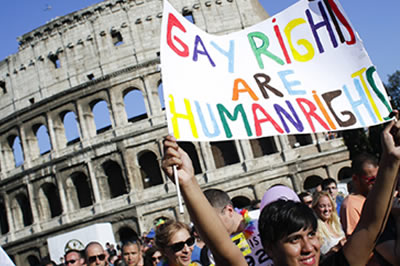


The European Court of Human Rights today, in a case litigated by ECSOL-member Alexander Schuster, found that Italy violated Article 8 ECHR by not introducing any form of legal recognition of same-gender couples. Whereas equal marriage, forthe time being, remains a decision for the Member States, recognition of same-gender unions, at least in the form of a registered partnership, is a human right.
The leading case Oliari et al v. Italy is the first ever against Italy in the field of LGBTI rights. The couple was represented by ECSOL-member Dr. Alexander Schuster. The action started as part of the strategic campaign still coordinated by the Associazione radicale Certi diritti. Oliari is the leading of several joined cases and was lodged well ahead of the others on 21 March 2011.
Dr Schuster instituted proceedings on behalf of Ms Oliari and his partner before the courts of Trento (north of Italy) and the Court of Appeal referred the matter on the constitutionality of opposite-sex only marriage to the Constitutional Court in 2009. In its decision no 138/2010 (English translation) Oliari and others were told that Parliament could freely decide whether or not to open up marriage, but that Parliament had a constitutional obligation to introduce a form of legal recognition of their union. Five years later, there is still no civil union law. Italy is now found in violation of the Convention.
Alexander Schuster’s statement: “I am glad the couple is given long-awaited justice. Italy is yet again found in violation of human rights. The Oliari case is of the greatest importance to all people in Europe, especially to those living in countries that, as Italy, fail to comply with international standards and deny dignity and equality to LGBTI people.”
Alexander Schuster is ECSOL-member for Italy and for European fundamental freedoms and EU citizenship, as well as a practicing lawyer and academic researcher in the field of fundamental rights. He coordinates the EU-funded project www.rightsonthemove.eu on the freedom of movement of rainbow families in Europe.
Excerpts from the judgment:
174. In view of the above considerations, the Court considers that in the absence of marriage, same-sex couples like the applicants have a particular interest in obtaining the option of entering into a form of civil union or registered partnership, since this would be the most appropriate way in which they could have their relationship legally recognised and which would guarantee them the relevant protection – in the form of core rights relevant to a couple in a stable and committed relationship – without unnecessary hindrance. Further, the Court has already held that such civil partnerships have an intrinsic value for persons in the applicants’ position, irrespective of the legal effects, however narrow or extensive, that they would produce (see Vallianatos, cited above, § 81). This recognition would further bring a sense of legitimacy to same-sex couples.
180. The Court notes that in Italy the need to recognise and protect such relationships has been given a high profile by the highest judicial authorities, including the Constitutional Court and the Court of Cassation. Reference is made particularly to the judgment of the Constitutional Court no. 138/10 in the first two applicants’ case, the findings of which were reiterated in a series of subsequent judgments in the following years (see some examples at paragraph 45 above). In such cases, the Constitutional Court, notably and repeatedly called for a juridical recognition of the relevant rights and duties of homosexual unions (see, inter alia, paragraph 16 above), a measure which could only be put in place by Parliament.
181. The Court observes that such an expression reflects the sentiments of a majority of the Italian population, as shown through official surveys (see paragraph 144 above). The statistics submitted indicate that there is amongst the Italian population a popular acceptance of homosexual couples, as well as popular support for their recognition and protection.
185. In conclusion, in the absence of a prevailing community interest being put forward by the Italian Government, against which to balance the applicants’ momentous interests as identified above, and in the light of domestic courts’ conclusions on the matter which remained unheeded, the Court finds that the Italian Government have overstepped their margin of appreciation and failed to fulfil their positive obligation to ensure that the applicants have available a specific legal framework providing for the recognition and protection of their same-sex unions.
187. There has accordingly been a violation of Article 8 of the Convention.
The Judgment
Alexander Schuster